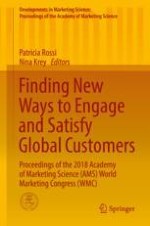2019 | OriginalPaper | Buchkapitel
Antecedents of Consumer Ethical Decision-Making: A Multidimensional Analysis of Emotions, Moral Intensity, Moral Philosophies, Personal Norms, and Intrinsic Religiosity
verfasst von : Marco Escadas, Marjan S. Jalali, Minoo Farhangmehr
Erschienen in: Finding New Ways to Engage and Satisfy Global Customers
Aktivieren Sie unsere intelligente Suche, um passende Fachinhalte oder Patente zu finden.
Wählen Sie Textabschnitte aus um mit Künstlicher Intelligenz passenden Patente zu finden. powered by
Markieren Sie Textabschnitte, um KI-gestützt weitere passende Inhalte zu finden. powered by
